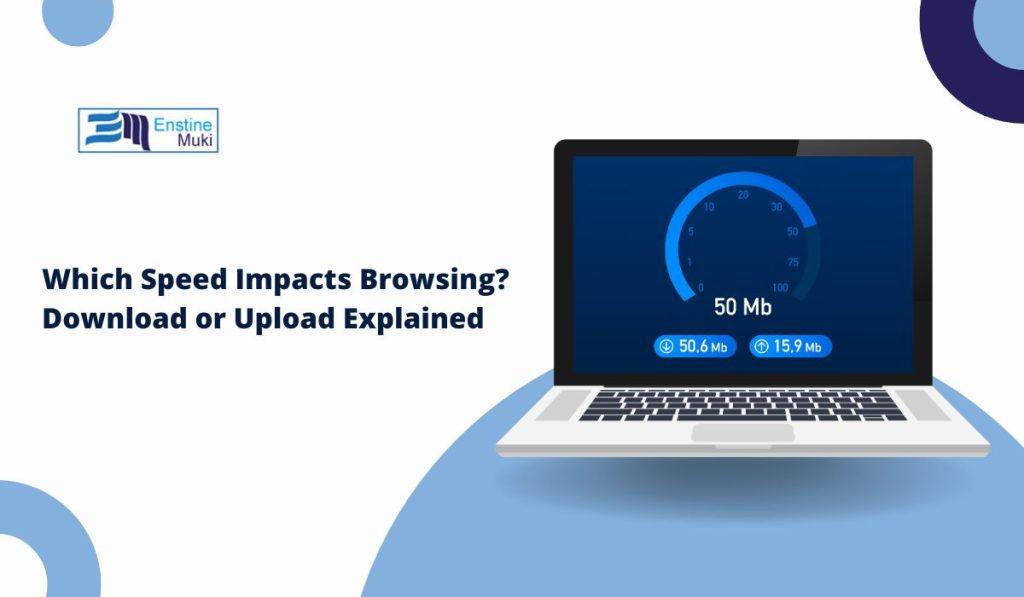When you browse the internet, your connection speed significantly impacts how quickly web pages load, videos stream, or files upload. Two key factors in your internet speed are download and upload speeds. But which one matters more for everyday browsing? This article explains the roles of download and upload speeds, their importance in various scenarios, and how to optimize your internet connection.
Understanding Download and Upload Speeds
To determine which speed is more critical, it’s important to understand the difference between download and upload speeds:
What Is Download Speed?
Download speed measures how quickly your device receives data from the internet. It’s used for activities like:
- Loading web pages.
- Streaming videos or music.
- Downloading files or images.
What Is Upload Speed?
Upload speed measures how fast your device sends data to the internet. It’s crucial for tasks like:
- Sending form data or emails.
- Uploading files to cloud services.
- Live-streaming or video conferencing.
Both speeds are measured in Mbps (megabits per second) and determine the efficiency of your online activities.
When Is Download Speed Used?
For most everyday browsing activities, download speed plays a dominant role. Examples include:
- Loading Web Pages: When you click a link or open a website, your browser downloads data like images, text, and videos from the server. A faster download speed ensures quicker page loading.
- Streaming Media: Whether you’re watching videos on YouTube or listening to music on Spotify, your device downloads continuous data streams. High download speeds are essential for smooth playback without buffering.
- Downloading Files: When you save an image, document, or software to your device, download speed directly affects how long it takes to complete the process.
When Is Upload Speed Used?
Upload speed is less noticeable during casual browsing but becomes critical for specific tasks, including:
- Sending Form Data: Every time you submit a form, perform a search, or log in to a website, your device sends small packets of data to the server. While these require minimal upload speed, it is still a necessary component.
- Uploading Files: Sharing photos, videos, or large documents to platforms like Google Drive or social media heavily relies on upload speed.
- Real-Time Activities: Upload speed plays a vital role in live streaming, video conferencing, and online gaming, where your device continuously sends data to servers in real time.
Which Speed Is More Important for Browsing?
For most browsing activities, download speed is far more important. This is because browsing is primarily about receiving data, such as loading content, videos, or images. However, upload speed becomes crucial for:
- Video calls or live streams.
- Uploading large files.
- Online gaming, where your actions (like shooting or moving) are sent to the server in real time.
In general, download speed determines how fast you can consume content, while upload speed determines how efficiently you can share data.
How to Test and Optimize Your Internet Speeds
Here are practical steps to test your current internet speeds and optimize both download and upload performance effectively:
Testing Your Speeds
Use tools like Speedtest.net or Fast.com to measure your current download and upload speeds. These tools provide accurate results and help identify bottlenecks.
Improving Download Speed
If your download speeds are slower than expected, there are several steps you can take to improve them. First, consider upgrading your internet plan to one with higher bandwidth, as this can significantly enhance your ability to load web pages, stream videos, and download files.
Additionally, optimizing your browser can make a noticeable difference—clear your cache regularly, disable unnecessary extensions, and opt for a lightweight browser that uses fewer resources.
For the most reliable and stable connection, switch from Wi-Fi to a wired Ethernet connection, which typically offers faster speeds and reduces potential interference.
Improving Upload Speed
To boost your upload speeds, start by optimizing your Wi-Fi settings. Switching to a 5GHz Wi-Fi band can provide faster upload rates compared to the standard 2.4GHz band. Next, manage your network usage by limiting background uploads; pause any ongoing cloud backups or large file uploads during critical tasks to prioritize bandwidth for immediate needs.
Conclusion
While both download and upload speeds are important for internet usage, download speed is the primary factor for smooth browsing. Upload speed plays a supporting role in specific activities like video conferencing, live streaming, or gaming. Regularly testing and optimizing your internet connection ensures the best browsing experience.
Do you experience issues with download or upload speeds? Share your thoughts in the comments below, and don’t forget to share this guide with others!

